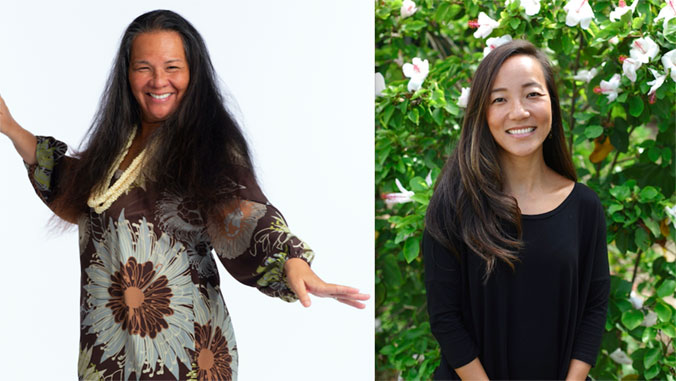
Two campus leaders who have worked to build a partnership between the University of Hawaiʻi at Mānoa and the local community have won the prestigious 2020 Robert Wood Johnson Foundation Community-Campus Partnerships for Health Award.
Jane Chung-Do, an associate professor with the Office of Public Health Studies of the Thompson School of Social Work & Public Health, and Ilima Ho Lastimosa, the community coordinator for the Waimānalo Learning Center of the College of Tropical Agriculture and Human Resources, said they were delighted that their project, the Waimānalo Pono Research Hui, was recognized with this award.
The award is given to recognize partnerships between community and academic institutions that are working together to achieve health equity amid the COVID-19 pandemic, systemic racism and economic collapse.
“Our hui aims to restore the health of Native Hawaiians,” Chung-Do said. “To do that, we need programming and research that revitalize cultural practices and identity, and recognize the impacts of historical trauma and the existing strengths and resilience of the community.”
This effort is an example of UH Mānoa’s goal of Becoming a Native Hawaiian Place of Learning (PDF), one of four goals identified in the 2015–25 Strategic Plan (PDF), updated in December 2020.
Improving health of Waimānalo community
The Waimānalo Pono Research Hui (WPRH) includes more than 50 community members and academic researchers. The group works to improve the health of the Waimānalo community through education and aloha ʻāina (love of the land).
“The WPRH is a safe space for community members and researchers to build relationships and initiate programs that are culturally-grounded and community-driven,” said Ho-Lastimosa, who founded the WPRH and is a Native Hawaiian cultural practitioner and recognized community leader. “Our goal is to honor and transfer ʻike (knowledge) and the values of our kūpuna (elders) to our keiki (children) through pono (just and balanced) research principles.”
The WPRH supports community initiatives that promote health equity and a culture of health that centers community voice and knowledge, Chung-Do said.
Over the next year, the hui’s goals are to meet the priorities that were identified by the community, which are limu (seaweed) restoration, ʻai pono (healthy and nourishing food) and lāʻau lapaʻau (traditional herbal Hawaiian medicine). The money from the award will be used to continue sustaining and supporting the community programs that have been initiated to meet these priorities.
“We will continue doing work with the community, by the community,” Ho Lastimosa said.

